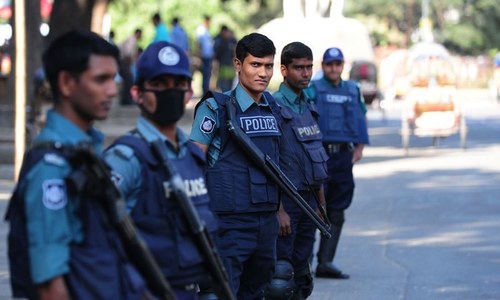NEW DELHI: Gunmen attacked a Shia mosque in Bangladesh, killing one person and wounding three others, in the latest in a wave of deadly assaults this year on foreigners, secular writers and members of the Shia community in the Sunni-majority nation.
The attacks, claimed by radical Islamist groups, have alarmed the international community and raised concerns that religious extremism is taking hold in the traditionally moderate country.
Related: One killed, three injured in gunmen attack on Shia mosque in Bangladesh
The militant Islamic State (IS) group and a local affiliate have claimed responsibility for the killings of two foreigners - an Italian aid worker and a Japanese agricultural worker - as well as the attack on the Shia mosque.
Bangladesh's government has repeatedly said that IS has no organizational presence in the country.
The government of Prime Minister Sheikh Hasina accuses domestic Islamist groups along with the main opposition Bangladesh Nationalist Party (BNP) and its main ally, the Jamaat-e-Islami (JeI) party, of carrying out the attacks for political gains.
A look at the main Islamic political parties and radical groups:
Jamaat- i-Islami
Jamaat-e-Islami is Bangladesh's largest Islamist party and a partner of the main opposition BNP, which is led by former Prime Minister Khaleda Zia - an arch rival of current leader Sheikh Hasina.
The party advocates the introduction of Sharia or Islamic laws.
The Jamaat and its leaders openly opposed Bangladesh's 1971 war to gain freedom from Pakistan.
Its members formed groups and militias to aid Pakistani soldiers during the war and acted as an auxiliary force involved in kidnappings and killings of those who supported independence. Many of its top leaders fled the country after independence but returned to Bangladesh following the assassination of independence leader Sheikh Mujibur Rahman in 1975.
The JI was banned for a brief period after the 1971 war, but was revived in 1979 after a military dictatorship took power following a series of coups and counter-coups.
The groups gained in strength and became a serious political force in Bangladeshi politics by the early 2000s.
Many of its top leaders have been accused of war crimes. Last week, Ali Ahsan Mohammad Mujahid, a top leader during the war, was executed despite concerns that the legal proceedings against him were flawed.
Both its former leader Ghulam Azam and its current chief Matiur Rahman Chowdhury have been convicted of war crimes under Hasina, who set up a special tribunal in 2010 to deal with 1971 crimes. Two other senior leaders have also been executed for their role in the 1971 war.
Bangladesh's High Court in 2013 canceled the party's registration, which means it cannot contest polls. The party has appealed the verdict.
Ansarullah Bangla team
Ansarullah Bangla Team, or ABT, came to light as an active Islamist group in 2013, when secular blogger Ahmed Rajib Haider was killed by unidentified attackers in front of his home in Dhaka.
Detectives arrested seven suspects, including students of a top private university and the group's alleged chief Jasimuddin Rahmani, a former imam of a Dhaka mosque.
They have been indicted and are currently facing trial. The other suspects said they were inspired to attack Haider by the sermons of Rahmani.
Bangladesh's intelligence officials have they said they tracked down the group after investigating a blog called "Ansarullah Bangla Team," which had five administrators, including two in Pakistan.
In 2014, detectives arrested a Bangladeshi man and said he was one of the blog's administrators.
Despite the arrests of at least 40 suspected members of the group, the blog remains active with other administrators who operate from abroad, according to Bangladeshi intelligence.
The group has claimed the responsibility for the killings of four secular bloggers this year.
The group, which has also operated under the name Ansar Al-Islam, is banned in Bangladesh.
Jamaat-ul-Mujahideen
The group was founded banned in 1998 by Shaikh Abdur Rahman, a religious teacher educated in Saudi Arabia.
It came to notice in 2001 when it emerged in conflict with an extremist communist group in Dinajpur district, in northern Bangladesh.
On August 17, 2005, it exploded about 500 home-made bombs at nearly 300 locations near simultaneously across the country as part of its campaign demanding the introduction of Sharia law.
Later it continued its violent campaign by attacking and killing judges and police, also threatened journalists and women for not wearing veils.
It created a huge network of supporters with some government officials saying that it has as many as 10,000 members.
In 2005, six of its top leaders including Rahman were arrested. In 2007, all of them were hanged after being convicted for the killings of two judges.
The group has attempted to regroup and remains active. Dabiq, a magazine of the IS group, has claimed that Rahman was the founder of the jihadi movement in Bangladesh.
On Thursday, police said they arrested five members of the group.
A military commander of the group was killed early Thursday during a gunfight in a Dhaka suburb, police say.
Related: IS claims attack on Shia mosque in Bangladesh: SITE
















































